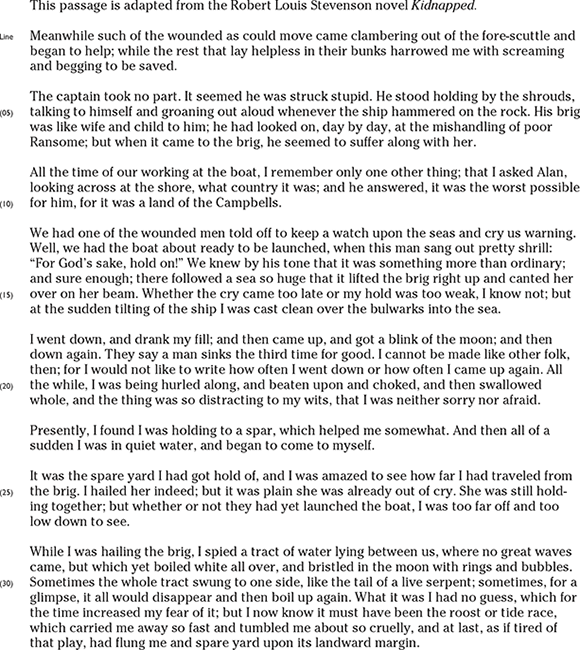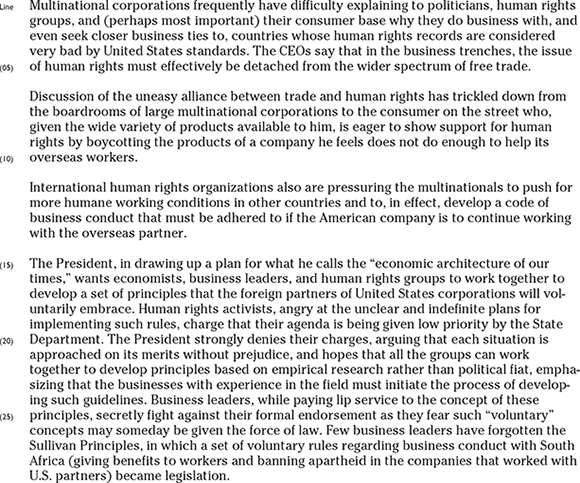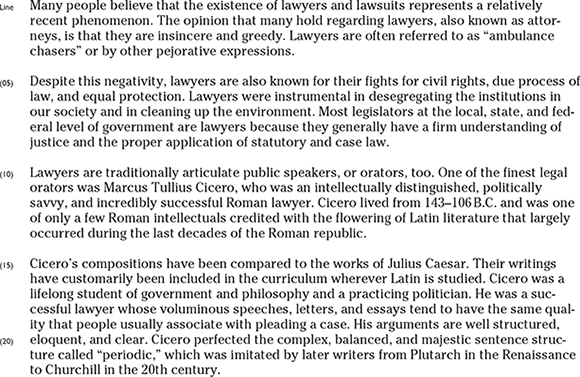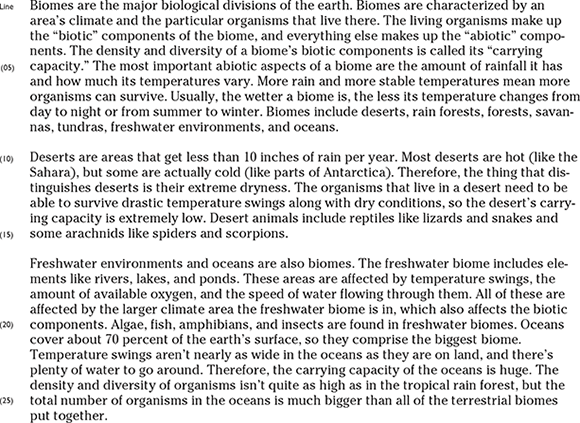Chapter 14
Where Are CliffsNotes When You Need Them? Reading Practice Questions
In This Chapter
 Celebrating diversity: Practicing the various passage types
Celebrating diversity: Practicing the various passage types
 Distinguishing the time-worthy questions from the time-waster ones
Distinguishing the time-worthy questions from the time-waster ones
On the actual ACT, the Reading Test consists of four full-length passages, each with about 750 words. Ten questions follow each passage. You have only 35 minutes to read the four passages and answer all 40 questions. This abbreviated practice exam (we want to ease you into this stuff slowly) has four shorter passages and a total of eight questions. Use it to practice your approach to the reading questions. Don’t worry about timing now. Think about what type of passage you’re dealing with (prose fiction, social science, humanities, or natural science) and identify each question type. A short explanation of the answer follows each question. See Chapters 20, 22, and 24 for the complete tests, and check out Chapter 13 for everything you need to know about the Reading Test.
Directions: Answer each question based on what is stated or implied in the passage.
Passage 1 — Prose Fiction
1.The narrator compares the ship to the captain’s wife and child to:
(A)lament the captain’s long separation from his family.
(B)demonstrate the difficulty the captain has keeping focused on his job.
(C)predict the captain’s future madness.
(D)show the depth of the connection the captain has to his ship.
The focus of Lines 4–7 is on how the captain is upset by the condition of his ship. To compare his ship to his wife and child is to show how much he loves the ship and, thus, to emphasize the deep attachment he has to the vessel. So the correct answer is Choice (D).
2.By saying that he “got a blink of the moon” in Line 17, the narrator most nearly means that he:
(F)he foresaw his own demise.
(G)he saw the sky as he came up out of the water to get air.
(H)he was hallucinating as he was drowning.
(J)a barely perceptible quarter moon hung low in the sky.
Line 17 describes the narrator’s dunking and near drowning. He was bobbing up and down in the water, going under the sea and then coming up for air, at which point he saw the moon. Make sure you answer the question in the context in which you find the statement; don’t use your own common sense. And if you picked Choice (J), you chose an answer that provided too much unjustifiable detail to be right. The correct answer is Choice (G).
Passage 2 — Social Science
3.Which of the following best states the central idea of the passage?
(A)Politicians are quixotic in their assessment of the priorities of the State Department.
(B)Multinational corporations have little, if any, influence on the domestic policies of their overseas partners.
(C)Disagreement exists between the desires of human rights activists to improve the working conditions of overseas workers and the practical approach taken by the corporations.
(D)It is inappropriate to expect foreign corporations to adhere to American standards.
The main idea of the passage is usually stated in the first sentence or two. The first sentence of this passage discusses the difficulties that corporations have in explaining their business ties to certain countries to politicians, human rights groups, and consumers. From this statement, you may infer that those groups disagree with the policies of the corporations. So the correct answer is Choice (C).
 Did you pick Choice (A) just because of the hard word, quixotic? It’s human nature (we’re all so insecure) to think that the hard word we don’t know must be the right answer, but it isn’t always so. Never choose an answer just because it has a word you can’t define unless you’re sure that all the answers with words you can define are wrong. Quixotic means idealistic, impractical (think of the fictional character Don Quixote tilting at windmills). The President’s belief is not the main idea of the passage.
Did you pick Choice (A) just because of the hard word, quixotic? It’s human nature (we’re all so insecure) to think that the hard word we don’t know must be the right answer, but it isn’t always so. Never choose an answer just because it has a word you can’t define unless you’re sure that all the answers with words you can define are wrong. Quixotic means idealistic, impractical (think of the fictional character Don Quixote tilting at windmills). The President’s belief is not the main idea of the passage.
 Just because a statement is (or may be) true doesn’t necessarily mean that it’s the correct answer to a question. Many of the answer choices to a big picture question in particular often are true or at least look plausible. To answer a main-idea question, pretend that a friend of yours just came up behind you and said, “Hey, what’cha reading there?” Your first response is the main idea: “Oh, I read this passage about how corporations are getting grief from politicians and other groups because they do business with certain countries.” Before you look at the answer choices, predict in your own words what the main idea is. You’ll be pleasantly surprised how close your prediction is to the correct answer (and you won’t be confused by all the other plausible-looking answer choices).
Just because a statement is (or may be) true doesn’t necessarily mean that it’s the correct answer to a question. Many of the answer choices to a big picture question in particular often are true or at least look plausible. To answer a main-idea question, pretend that a friend of yours just came up behind you and said, “Hey, what’cha reading there?” Your first response is the main idea: “Oh, I read this passage about how corporations are getting grief from politicians and other groups because they do business with certain countries.” Before you look at the answer choices, predict in your own words what the main idea is. You’ll be pleasantly surprised how close your prediction is to the correct answer (and you won’t be confused by all the other plausible-looking answer choices).
 Choice (D) is a moral value, a judgment call. Who’s to say what’s appropriate and what’s inappropriate? An answer that passes judgment, one that says something is morally right or morally wrong, is almost never the correct answer on the ACT.
Choice (D) is a moral value, a judgment call. Who’s to say what’s appropriate and what’s inappropriate? An answer that passes judgment, one that says something is morally right or morally wrong, is almost never the correct answer on the ACT.
4.Which of the following statements about the Sullivan Principles can best be inferred from the passage?
(F)They had a detrimental effect on the profits of those corporations doing business with South Africa.
(G)They represented an improper alliance between political and business groups.
(H)They placed the needs of the foreign workers over those of the domestic workers whose jobs would therefore be in jeopardy.
(J)They will have a chilling effect on future adoption of voluntary guidelines.
Choice (F) is the major trap here. Perhaps you assumed that because the companies seem to dislike the Sullivan Principles, they hurt company profits. However, the passage doesn’t say anything about profits. Maybe the companies still made good profits but objected to the Sullivan Principles on principle. The companies just may not have wanted such governmental intervention even if profits didn’t decrease. If you picked Choice (F), you read too much into the question and probably didn’t read the rest of the answer choices.
In Choice (J), the phrase “chilling effect” means a negative or discouraging effect. Think of something with a chilling effect as leaving you cold. Because few corporations have forgotten the Sullivan Principles, you may infer that these principles will discourage the companies from agreeing to voluntary principles in the future. Thus, the correct answer is (J).
 To get this question correct, you really need to understand the whole passage. If you didn’t know what was going on here, you’d be better off just to guess and move on. An inference question usually means you have to read between the lines; you can’t just go back to one specific portion of the passage and get the answer quickly.
To get this question correct, you really need to understand the whole passage. If you didn’t know what was going on here, you’d be better off just to guess and move on. An inference question usually means you have to read between the lines; you can’t just go back to one specific portion of the passage and get the answer quickly.
Passage 3 — Humanities
5.Pejorative, as it appears in Line 4, most nearly means:
(A)comic.
(B)dishonest.
(C)self-serving.
(D)uncomplimentary.
Get clues for answering this question from the information around the word. The passage classifies “ambulance chaser” as a pejorative expression. In the next sentence, the author uses the phrase “this negativity” to refer to the act of using pejorative statements for attorneys. Therefore, pejorative must have a negative connotation. You can eliminate Choice (A) — even though the thought of an overweight attorney running after a screaming ambulance may make you laugh. Plug the remaining choices into the sentence to see which one makes the best substitute for pejorative. The obvious answer is uncomplimentary. So the correct answer is Choice (D).
 If you picked Choice (B) or (C), you were probably thinking of words that describe the way that the author says many people think of attorneys. Dishonest is a synonym for insincere, and self-serving has a meaning that’s similar to greedy. Trap answers like Choices (B) and (C) are why you must read your answers in the context of the sentence. By doing so, you see that pejorative describes the expressions that others give to attorneys, not the attorneys themselves.
If you picked Choice (B) or (C), you were probably thinking of words that describe the way that the author says many people think of attorneys. Dishonest is a synonym for insincere, and self-serving has a meaning that’s similar to greedy. Trap answers like Choices (B) and (C) are why you must read your answers in the context of the sentence. By doing so, you see that pejorative describes the expressions that others give to attorneys, not the attorneys themselves.
6.Which of these, according to the author, is a way that lawyers have positively contributed to society?
(F)They have fought legislation designed to clean up the environment.
(G)They have proposed laws to make “ambulance chasing” illegal.
(H)They have taught public speaking skills to disadvantaged youth.
(J)They have advocated for integration of public institutions.
The author covers the positive attributes of lawyers in the second paragraph, which mentions their contributions to cleaning up the environment and promoting integration. The passage doesn’t say anything about the legalization of “ambulance chasing” or teaching public speaking, so you can eliminate Choices (G) and (H). Choice (F) is a little tricky if you don’t read it carefully. Because Choice (F) says that attorneys have fought rather than promoted cleaning up the environment, it says just the opposite of what the passage states. So Choice (J) is the correct answer.
Passage 4 — Natural Science
7.According to the passage, an accurate definition of “carrying capacity” of a biome would be:
(A)the number and variety of living organisms it has.
(B)the type of abiotic features it has.
(C)its level of humidity.
(D)how much its temperatures vary.
The first paragraph defines “carrying capacity” as the density and diversity of a biome’s components. A good paraphrase for this definition is the number and variety of organisms, or Choice (A). The other answers refer to other characteristics of a biome that appear in the passage but don’t define carrying capacity.
 Don’t immediately pick an answer choice just because you see it mentioned in the passage. The correct answer must apply specifically to the question being asked.
Don’t immediately pick an answer choice just because you see it mentioned in the passage. The correct answer must apply specifically to the question being asked.
8.According to the passage, all of these elements affect the quality of a freshwater environment EXCEPT:
(F)oxygen levels.
(G)swings in temperature.
(H)the larger climate in which it exists.
(J)the policies of the country in which it exists.
The answer to this exception question comes straight from the passage. Lines 17–18 say that freshwater biomes are affected by temperature swings, the amount of available oxygen, and the speed of water flowing through them, so you can eliminate Choices (F), (G), and (H). The passage doesn’t cover issues that are unrelated to the natural environment, so the correct answer is Choice (J).
 The best way to answer exception questions is to turn the wording around a bit. For example, you can approach this question by asking yourself to choose the answer that states something that doesn’t affect the quality of a freshwater environment.
The best way to answer exception questions is to turn the wording around a bit. For example, you can approach this question by asking yourself to choose the answer that states something that doesn’t affect the quality of a freshwater environment.
 Celebrating diversity: Practicing the various passage types
Celebrating diversity: Practicing the various passage types Distinguishing the time-worthy questions from the time-waster ones
Distinguishing the time-worthy questions from the time-waster ones

 Did you pick Choice (A) just because of the hard word, quixotic? It’s human nature (we’re all so insecure) to think that the hard word we don’t know must be the right answer, but it isn’t always so. Never choose an answer just because it has a word you can’t define unless you’re sure that all the answers with words you can define are wrong. Quixotic means idealistic, impractical (think of the fictional character Don Quixote tilting at windmills). The President’s belief is not the main idea of the passage.
Did you pick Choice (A) just because of the hard word, quixotic? It’s human nature (we’re all so insecure) to think that the hard word we don’t know must be the right answer, but it isn’t always so. Never choose an answer just because it has a word you can’t define unless you’re sure that all the answers with words you can define are wrong. Quixotic means idealistic, impractical (think of the fictional character Don Quixote tilting at windmills). The President’s belief is not the main idea of the passage. Just because a statement is (or may be) true doesn’t necessarily mean that it’s the correct answer to a question. Many of the answer choices to a big picture question in particular often are true or at least look plausible. To answer a main-idea question, pretend that a friend of yours just came up behind you and said, “Hey, what’cha reading there?” Your first response is the main idea: “Oh, I read this passage about how corporations are getting grief from politicians and other groups because they do business with certain countries.” Before you look at the answer choices, predict in your own words what the main idea is. You’ll be pleasantly surprised how close your prediction is to the correct answer (and you won’t be confused by all the other plausible-looking answer choices).
Just because a statement is (or may be) true doesn’t necessarily mean that it’s the correct answer to a question. Many of the answer choices to a big picture question in particular often are true or at least look plausible. To answer a main-idea question, pretend that a friend of yours just came up behind you and said, “Hey, what’cha reading there?” Your first response is the main idea: “Oh, I read this passage about how corporations are getting grief from politicians and other groups because they do business with certain countries.” Before you look at the answer choices, predict in your own words what the main idea is. You’ll be pleasantly surprised how close your prediction is to the correct answer (and you won’t be confused by all the other plausible-looking answer choices). Choice (D) is a moral value, a judgment call. Who’s to say what’s appropriate and what’s inappropriate? An answer that passes judgment, one that says something is morally right or morally wrong, is almost never the correct answer on the ACT.
Choice (D) is a moral value, a judgment call. Who’s to say what’s appropriate and what’s inappropriate? An answer that passes judgment, one that says something is morally right or morally wrong, is almost never the correct answer on the ACT.
